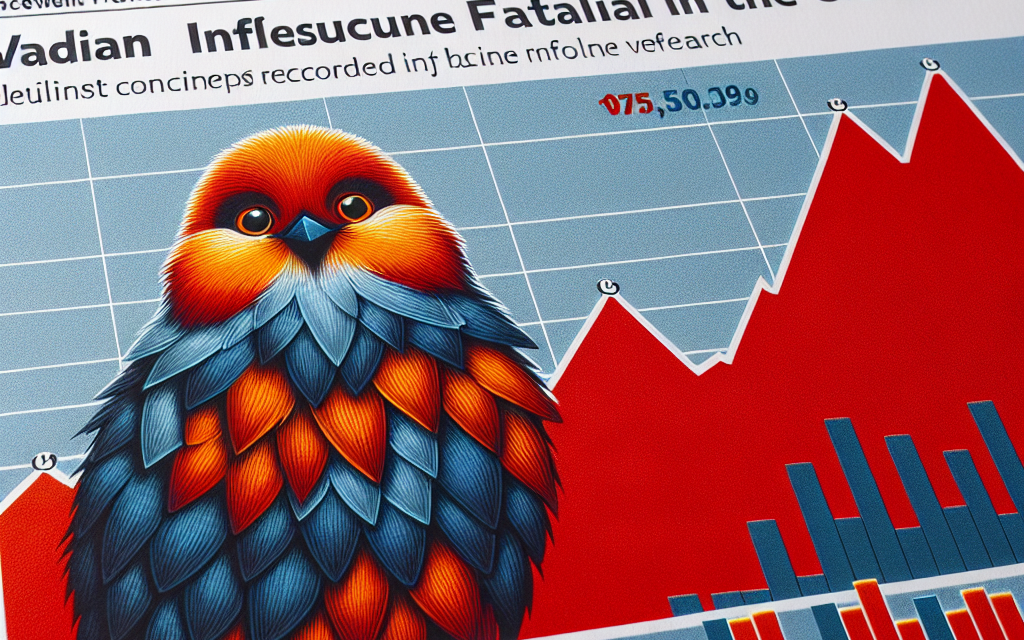“Moderna Stock Dips as Bird Flu Death Raises Alarm on Vaccine Readiness.”
Introduction
Moderna’s stock experienced a notable decline following the announcement of the first human death from bird flu in the United States, raising concerns about the efficacy and readiness of vaccine development for emerging infectious diseases. This incident has sparked discussions about the preparedness of pharmaceutical companies to respond to potential pandemics, particularly in light of the ongoing challenges posed by avian influenza. Investors are closely monitoring the situation, as the implications for vaccine research and public health responses could significantly impact Moderna’s market position and future growth prospects.
Moderna Stock Performance Analysis Amid Bird Flu Concerns
In recent weeks, Moderna’s stock has experienced notable fluctuations, particularly in light of the first reported human death from bird flu in the United States. This incident has reignited discussions surrounding vaccine development and public health preparedness, raising concerns among investors about the company’s ability to pivot effectively in response to emerging infectious diseases. As the world grapples with the ongoing implications of the COVID-19 pandemic, the focus on vaccine technology has intensified, and Moderna, a key player in this arena, finds itself at a critical juncture.
The recent bird flu case, which resulted in a fatality, has underscored the potential risks associated with zoonotic diseases—those that can be transmitted from animals to humans. This situation has prompted a renewed interest in vaccine research and development, particularly for viruses that have historically posed a threat to public health. Investors are acutely aware that while Moderna has established itself as a leader in mRNA technology, the company must navigate a complex landscape of regulatory approvals, clinical trials, and market competition to maintain its position.
As the stock market reacted to the news of the bird flu death, Moderna’s shares dipped, reflecting investor anxiety about the company’s capacity to respond to this new challenge. The decline in stock price can be attributed to several factors, including the uncertainty surrounding the timeline for developing a vaccine against the avian influenza virus and the potential for increased scrutiny from health authorities. Furthermore, the market’s reaction highlights a broader concern regarding the sustainability of Moderna’s growth trajectory post-COVID-19, as the company seeks to diversify its vaccine portfolio beyond its successful COVID-19 vaccine.
In addition to the immediate implications of the bird flu incident, investors are also considering the long-term prospects for Moderna’s vaccine development pipeline. The company has made significant strides in expanding its research efforts to address various infectious diseases, including seasonal flu and other viral threats. However, the recent dip in stock performance serves as a reminder that the path to successful vaccine development is fraught with challenges. Investors are keenly aware that the speed at which a vaccine can be developed, tested, and brought to market is critical, especially in the face of emerging health threats.
Moreover, the competitive landscape for vaccine development is becoming increasingly crowded, with numerous biotech firms and pharmaceutical companies vying for market share. This competition adds another layer of complexity to Moderna’s strategic planning, as the company must not only innovate but also differentiate its offerings in a rapidly evolving market. The recent bird flu case may serve as a catalyst for increased investment in research and development, but it also raises questions about the company’s ability to maintain its competitive edge.
In conclusion, the recent dip in Moderna’s stock performance amid concerns surrounding bird flu highlights the intricate relationship between public health developments and market dynamics. As the company navigates the challenges of vaccine development in a post-pandemic world, investors will be closely monitoring its progress and strategic decisions. The ability to adapt to emerging threats while sustaining growth will be crucial for Moderna’s future success, and the recent events serve as a poignant reminder of the unpredictable nature of the biotech landscape. As the situation evolves, stakeholders will undoubtedly keep a watchful eye on how Moderna responds to these challenges and the implications for its stock performance moving forward.
Impact of Bird Flu Deaths on Vaccine Development Strategies
The recent death of a patient in the United States due to bird flu has raised significant concerns regarding vaccine development strategies, particularly in the context of the ongoing efforts by pharmaceutical companies like Moderna. This incident not only underscores the potential severity of avian influenza but also highlights the urgent need for effective vaccines to combat emerging infectious diseases. As the public health community grapples with the implications of this tragic event, the focus shifts to how such occurrences can influence vaccine research and development.
In light of the bird flu death, the urgency for a robust vaccine strategy becomes increasingly apparent. Historically, avian influenza has posed a threat to both animal and human health, with sporadic outbreaks leading to severe illness and mortality. The recent case serves as a stark reminder that the virus can cross species barriers, necessitating a proactive approach to vaccine development. Consequently, pharmaceutical companies are compelled to reassess their research priorities and allocate resources toward creating vaccines that can effectively target not only seasonal influenza but also more virulent strains like H5N1 and H7N9.
Moreover, the financial implications of such developments cannot be overlooked. The dip in Moderna’s stock following the news of the bird flu death reflects investor sentiment regarding the company’s ability to pivot its focus amid emerging health threats. Investors are increasingly aware that the landscape of infectious diseases is constantly evolving, and companies that fail to adapt may find themselves at a disadvantage. This situation emphasizes the importance of agility in vaccine development, as companies must be prepared to respond swiftly to new threats while maintaining their existing product pipelines.
In addition to financial considerations, the scientific community faces the challenge of ensuring that vaccine candidates are not only effective but also safe for public use. The process of developing a vaccine is inherently complex, involving rigorous testing and regulatory scrutiny. The recent bird flu case may prompt regulatory agencies to expedite the review process for vaccines targeting avian influenza, but it also raises questions about the balance between speed and safety. As researchers work to develop vaccines that can be rapidly deployed in response to outbreaks, they must also ensure that these vaccines undergo thorough evaluation to mitigate any potential risks to public health.
Furthermore, the global nature of infectious diseases necessitates international collaboration in vaccine development. The interconnectedness of our world means that a localized outbreak can quickly escalate into a global health crisis. In this context, sharing data, resources, and expertise becomes crucial. The recent bird flu death may serve as a catalyst for increased cooperation among nations and pharmaceutical companies, fostering an environment where innovative solutions can be developed more efficiently.
As the public health landscape continues to evolve, the implications of the bird flu death extend beyond immediate health concerns. It serves as a wake-up call for stakeholders in the vaccine development arena, highlighting the need for preparedness and adaptability in the face of emerging threats. The lessons learned from this incident may ultimately lead to more robust vaccine strategies, ensuring that we are better equipped to handle future outbreaks. In conclusion, while the recent dip in Moderna’s stock reflects immediate market reactions, it also signals a broader conversation about the importance of investing in vaccine research and development to safeguard public health against the ever-present threat of infectious diseases.
Investor Sentiment: Moderna’s Response to Vaccine Efficacy Fears
Investor sentiment surrounding Moderna has recently been influenced by a series of developments that have raised concerns about vaccine efficacy, particularly in light of the first reported human death from bird flu in the United States. This incident has not only drawn attention to the potential risks associated with avian influenza but has also sparked discussions about the preparedness of vaccine manufacturers, including Moderna, to respond to emerging infectious diseases. As a result, the stock has experienced a notable dip, reflecting the anxieties of investors who are closely monitoring the evolving landscape of public health and vaccine development.
In the wake of the bird flu death, questions have arisen regarding the effectiveness of existing vaccines against this strain of the virus. While Moderna has made significant strides in mRNA technology, which has proven effective against COVID-19, the company faces scrutiny over its ability to pivot and develop vaccines for other viral threats. Investors are particularly concerned about the speed and efficiency with which Moderna can adapt its vaccine platform to address new pathogens, especially given the unpredictable nature of viral mutations. This uncertainty has led to a cautious approach among investors, who are weighing the potential risks against the company’s historical performance and innovative capabilities.
Moreover, the recent incident has highlighted the broader implications of vaccine development in the context of public health emergencies. The urgency of responding to outbreaks like bird flu necessitates not only rapid research and development but also robust regulatory pathways that can facilitate timely vaccine deployment. Investors are keenly aware that any delays or setbacks in vaccine efficacy could have significant repercussions for Moderna’s market position and financial performance. Consequently, the stock’s decline can be seen as a reflection of these heightened concerns, as investors reassess the company’s readiness to tackle future health crises.
In addition to the immediate implications of the bird flu death, there is a growing recognition of the need for diversified vaccine portfolios. Investors are increasingly looking for companies that can demonstrate versatility in their vaccine development strategies. Moderna’s focus on mRNA technology has positioned it as a leader in the field, yet the recent events underscore the importance of having a comprehensive approach that encompasses various viral threats. This diversification is crucial not only for mitigating risks but also for ensuring sustained growth in a competitive market.
As the situation unfolds, Moderna’s response to these challenges will be critical in shaping investor sentiment. The company has a track record of innovation and adaptability, which could serve as a foundation for regaining investor confidence. By actively communicating its strategies for addressing emerging infectious diseases and demonstrating progress in vaccine development, Moderna can reassure stakeholders of its commitment to public health and its capacity to respond effectively to new threats.
In conclusion, the recent dip in Moderna’s stock price reflects a complex interplay of investor sentiment, public health concerns, and the challenges of vaccine development. As the company navigates these turbulent waters, its ability to adapt and innovate will be paramount in restoring confidence among investors. The ongoing dialogue surrounding vaccine efficacy and preparedness will undoubtedly continue to shape the landscape for Moderna and its peers, making it essential for the company to remain proactive in addressing these critical issues.
The Role of mRNA Technology in Addressing Emerging Infectious Diseases
The emergence of infectious diseases has long posed a significant threat to global health, necessitating rapid and effective responses from the scientific community. In recent years, mRNA technology has emerged as a groundbreaking approach to vaccine development, particularly highlighted by its success in combating the COVID-19 pandemic. However, as the recent dip in Moderna’s stock following the first reported human death from bird flu in the United States suggests, the challenges of addressing emerging infectious diseases remain formidable. This incident underscores the urgent need for continued innovation and investment in mRNA technology to enhance our preparedness for future outbreaks.
mRNA vaccines work by utilizing a small piece of the virus’s genetic material to instruct cells in the body to produce a harmless protein that mimics a part of the virus. This process triggers an immune response, equipping the body to recognize and combat the actual virus if encountered. The speed and flexibility of mRNA technology are particularly advantageous in the face of rapidly evolving pathogens. For instance, when the COVID-19 virus emerged, researchers were able to develop and deploy mRNA vaccines in record time, demonstrating the potential of this technology to respond to urgent health crises.
As we confront the threat of avian influenza, the recent bird flu case serves as a stark reminder of the unpredictable nature of infectious diseases. The virus, which primarily affects birds, has shown the ability to jump to humans, raising concerns about its potential to cause widespread outbreaks. In this context, mRNA technology could play a pivotal role in developing vaccines that can be rapidly adapted to target new strains of the virus. The ability to swiftly modify mRNA sequences allows for a more agile response to emerging threats, which is crucial in an era where zoonotic diseases are becoming increasingly common.
Moreover, the versatility of mRNA technology extends beyond just vaccines. Research is ongoing into its application for therapeutic interventions, including treatments for various infectious diseases. This adaptability positions mRNA as a key player in the broader strategy to combat not only avian influenza but also other pathogens that may emerge in the future. By investing in mRNA research and development, we can build a robust arsenal against a wide range of infectious diseases, ultimately enhancing global health security.
However, the recent stock dip for Moderna highlights the inherent uncertainties in the biotech sector, particularly when it comes to vaccine development. Investors and stakeholders are acutely aware that the path from research to market is fraught with challenges, including regulatory hurdles, public acceptance, and the ever-present risk of new variants. As such, while mRNA technology holds immense promise, it is essential to approach its development with a balanced perspective that acknowledges both its potential and its limitations.
In conclusion, the role of mRNA technology in addressing emerging infectious diseases is increasingly vital, especially in light of recent health events such as the bird flu case in the United States. The ability to rapidly develop and adapt vaccines using mRNA could significantly enhance our response to future outbreaks. Nevertheless, as the market reacts to these developments, it is crucial for stakeholders to remain focused on the long-term benefits of mRNA research. By fostering innovation and collaboration within the scientific community, we can better prepare for the inevitable challenges posed by emerging infectious diseases, ultimately safeguarding public health on a global scale.
Historical Context: Vaccine Development Challenges During Health Crises
The recent dip in Moderna’s stock, following the announcement of the first human death from bird flu in the United States, underscores the ongoing challenges associated with vaccine development during health crises. Historically, the process of developing vaccines has been fraught with difficulties, particularly when faced with emerging infectious diseases. The urgency of a health crisis often amplifies these challenges, as public health officials and pharmaceutical companies race against time to produce effective vaccines that can mitigate the impact of a disease outbreak.
In the past, the development of vaccines has typically required years, if not decades, of research and testing. This lengthy process is primarily due to the need for rigorous safety and efficacy evaluations. For instance, during the 2009 H1N1 influenza pandemic, vaccine manufacturers faced significant hurdles in scaling up production to meet the sudden surge in demand. Although the vaccine was ultimately developed and distributed, the experience highlighted the complexities involved in rapid vaccine deployment, particularly when the pathogen is novel and not well understood.
Moreover, the historical context of vaccine development reveals that scientific advancements do not always translate into timely solutions during crises. The Ebola outbreak in West Africa from 2014 to 2016 serves as a poignant example. Despite the urgent need for a vaccine, it took several years for a safe and effective vaccine to be developed and approved for use. This delay was attributed to various factors, including funding limitations, logistical challenges, and the need for extensive clinical trials to ensure safety. Consequently, the outbreak resulted in thousands of deaths, emphasizing the critical need for a more agile vaccine development process.
Transitioning to the present, the COVID-19 pandemic has further illuminated the complexities of vaccine development. The rapid development of mRNA vaccines, such as those produced by Moderna and Pfizer-BioNTech, showcased the potential for accelerated timelines in response to urgent health threats. However, this unprecedented speed also raised concerns about long-term safety and efficacy, as the vaccines were developed and authorized for emergency use in record time. The subsequent emergence of variants has added another layer of complexity, necessitating ongoing research and potential updates to existing vaccines.
As the recent bird flu case illustrates, the threat of zoonotic diseases remains a significant concern for public health. The potential for avian influenza to mutate and spread among humans poses a serious risk, prompting calls for vigilance and preparedness. In this context, the challenges of vaccine development become even more pronounced. The need for rapid response capabilities, coupled with the necessity for thorough testing, creates a delicate balance that must be navigated carefully.
In conclusion, the historical challenges of vaccine development during health crises serve as a reminder of the complexities involved in protecting public health. The recent dip in Moderna’s stock, in light of the bird flu death, highlights the ongoing concerns surrounding vaccine efficacy and the need for continued investment in research and development. As we move forward, it is imperative that lessons learned from past outbreaks inform our approach to future vaccine development, ensuring that we are better equipped to respond to emerging infectious diseases. The interplay between urgency and safety will remain a critical consideration as we strive to safeguard public health in an increasingly interconnected world.
Future Outlook: Moderna’s Pipeline in Light of Recent Events
In light of recent developments surrounding the first reported human death from bird flu in the United States, concerns regarding vaccine development have come to the forefront, particularly for companies like Moderna. The incident has not only raised alarms about public health but has also cast a shadow over the future of vaccine innovation and the stock performance of companies engaged in this critical field. As investors and analysts assess the implications of this tragic event, it is essential to consider Moderna’s pipeline and its strategic positioning in the evolving landscape of vaccine development.
Moderna, known for its pioneering mRNA technology, has made significant strides in the realm of infectious diseases, particularly with its COVID-19 vaccine. However, the emergence of new viral threats, such as the avian influenza virus, underscores the necessity for rapid adaptation and innovation in vaccine research. The recent bird flu case serves as a stark reminder of the unpredictable nature of viral outbreaks and the urgent need for preparedness. Consequently, Moderna’s ability to pivot and respond to such challenges will be critical in determining its future success.
Looking ahead, Moderna has a robust pipeline that includes not only its COVID-19 vaccine but also candidates targeting various infectious diseases, including influenza and respiratory syncytial virus (RSV). The company has been actively working on a combination vaccine that could address multiple strains of influenza, which would be particularly relevant in the context of the recent bird flu incident. This proactive approach to vaccine development positions Moderna favorably, as it seeks to leverage its mRNA technology to create more effective and versatile vaccines.
Moreover, the recent events may catalyze increased investment in vaccine research and development, particularly in the area of pandemic preparedness. Governments and health organizations are likely to reassess their strategies and allocate more resources toward developing vaccines that can be rapidly deployed in response to emerging threats. In this context, Moderna’s established expertise in mRNA technology could make it a key player in future vaccine initiatives, potentially leading to new partnerships and funding opportunities.
However, it is essential to recognize that the path forward is not without challenges. The public’s perception of vaccine safety and efficacy can be influenced by high-profile incidents, such as the bird flu death, which may lead to increased scrutiny of vaccine candidates. Additionally, the competitive landscape is becoming increasingly crowded, with numerous biotech firms and pharmaceutical companies vying for a share of the vaccine market. As such, Moderna must not only focus on advancing its pipeline but also on effectively communicating the benefits and safety of its products to both healthcare providers and the public.
In conclusion, while the recent bird flu death has raised valid concerns about vaccine development, it also presents an opportunity for Moderna to reinforce its commitment to innovation and public health. By continuing to advance its pipeline and addressing the challenges posed by emerging infectious diseases, Moderna can position itself as a leader in the vaccine space. As the company navigates this complex landscape, its ability to adapt and respond to new threats will be crucial in shaping its future trajectory and maintaining investor confidence. Ultimately, the ongoing evolution of the global health landscape will require a concerted effort from all stakeholders to ensure that effective vaccines are developed and made accessible in a timely manner.
Comparing Moderna’s Stock Trends with Other Vaccine Manufacturers
In recent weeks, Moderna’s stock has experienced notable fluctuations, particularly in light of the first reported human death from bird flu in the United States. This incident has reignited discussions surrounding vaccine development and the efficacy of existing vaccines, prompting investors to reassess their positions in the biotechnology sector. As Moderna’s stock dips, it becomes essential to compare its performance with that of other vaccine manufacturers to gain a clearer understanding of the market dynamics at play.
Moderna, known for its mRNA technology, has been at the forefront of the COVID-19 vaccine rollout, which significantly boosted its stock price during the pandemic. However, as the urgency surrounding COVID-19 wanes, the company faces new challenges, including the need to pivot its research focus toward emerging infectious diseases, such as avian influenza. This shift is critical, especially in light of the recent bird flu death, which has raised concerns about the potential for a pandemic and the adequacy of current vaccine strategies. Investors are now weighing the implications of this incident on Moderna’s future growth prospects, leading to a cautious approach in trading.
In contrast, other vaccine manufacturers, such as Pfizer and Johnson & Johnson, have also experienced stock volatility but have diversified their portfolios beyond COVID-19 vaccines. Pfizer, for instance, has been actively involved in developing treatments for various diseases, including oncology and rare diseases, which may provide a buffer against the uncertainties associated with infectious disease outbreaks. This diversification strategy has allowed Pfizer to maintain a more stable stock performance compared to Moderna, which is heavily reliant on the success of its mRNA platform.
Moreover, Novavax, another player in the vaccine market, has faced its own set of challenges. The company has struggled with production delays and regulatory hurdles, which have adversely affected its stock performance. However, Novavax’s focus on developing a protein-based vaccine for COVID-19 and its ongoing research into other infectious diseases may position it favorably in the long term. As investors evaluate these companies, they are increasingly considering not only the immediate impacts of current events but also the long-term viability of their respective vaccine platforms.
As the market reacts to the implications of the bird flu death, it is essential to recognize that investor sentiment is often influenced by broader trends in public health and vaccine development. The recent incident has underscored the importance of preparedness for potential pandemics, prompting discussions about the need for robust vaccine pipelines. Companies that can demonstrate agility in adapting their research and development efforts to address emerging threats may be better positioned to attract investor confidence.
In conclusion, while Moderna’s stock has dipped in response to the recent bird flu death, it is crucial to contextualize this movement within the broader landscape of vaccine manufacturers. By comparing Moderna’s performance with that of Pfizer, Johnson & Johnson, and Novavax, it becomes evident that diversification and adaptability are key factors influencing investor sentiment. As the biotechnology sector continues to evolve, companies that can effectively navigate the complexities of vaccine development and public health challenges will likely emerge as leaders in the market. Thus, the current situation serves as a reminder of the intricate interplay between health crises and financial markets, highlighting the need for ongoing vigilance and innovation in vaccine research.
Q&A
1. **What recent event has raised concerns about Moderna’s vaccine development?**
– The first reported human death from bird flu in the U.S. has raised concerns about the effectiveness and readiness of vaccines.
2. **How did Moderna’s stock react to the news of the bird flu death?**
– Moderna’s stock experienced a dip following the announcement of the bird flu death.
3. **What is the significance of the bird flu in relation to vaccine development?**
– The bird flu highlights potential gaps in vaccine preparedness and the urgency for effective vaccines against emerging infectious diseases.
4. **What are investors worried about regarding Moderna’s future?**
– Investors are concerned that Moderna may face challenges in rapidly developing vaccines for new strains of viruses, impacting future revenue.
5. **Has Moderna been involved in bird flu vaccine development before?**
– Yes, Moderna has been working on developing vaccines for various strains of influenza, including bird flu.
6. **What other factors might contribute to Moderna’s stock volatility?**
– Factors include competition from other vaccine developers, regulatory challenges, and overall market conditions affecting biotech stocks.
7. **What should investors consider when evaluating Moderna’s stock in light of this news?**
– Investors should consider the company’s pipeline, its ability to respond to emerging health threats, and the broader market sentiment towards biotech stocks.
Conclusion
The recent dip in Moderna’s stock, following the first reported human death from bird flu in the U.S., underscores growing concerns about vaccine development and public health preparedness. Investors are wary of the potential implications for vaccine efficacy and the company’s ability to respond to emerging infectious diseases. This situation highlights the critical need for ongoing research and development in the vaccine sector to address evolving health threats effectively.





